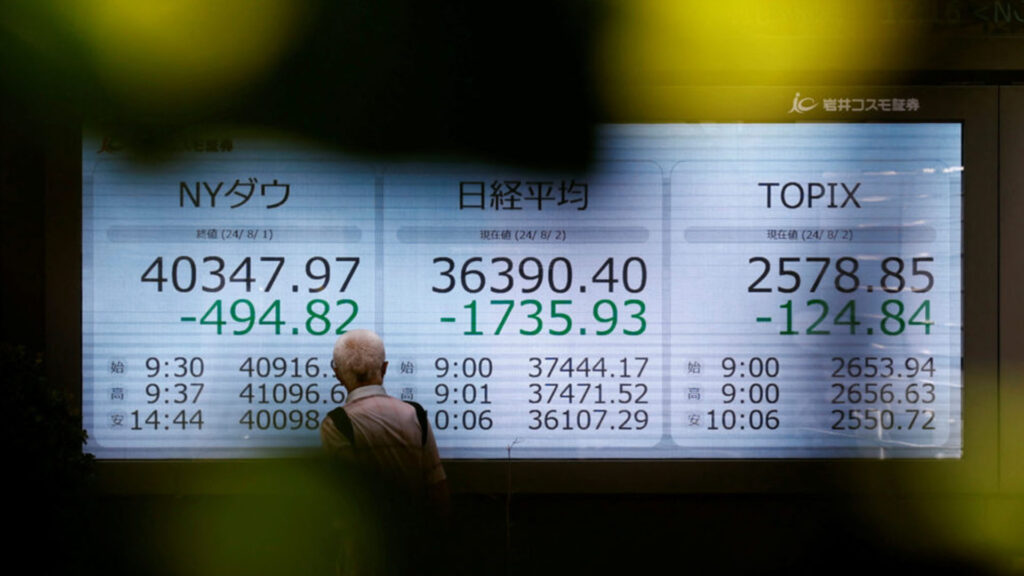
Newsletter Subscribe
Enter your email address below and subscribe to our newsletter

Enter your email address below and subscribe to our newsletter

Dow drops nearly 1,000 points as global markets tumble on economic fears. Japanese stocks suffer their worst crash since 1987.
In a dramatic turn of events, major indices on Wall Street experienced significant declines on Monday, fueled by growing concerns over a slowing U.S. economy. The downturn extended beyond U.S. borders, affecting global markets and leading to a day of steep losses.
Monday saw a significant downturn across global markets as fears of a slowing U.S. economy intensified. The Dow Jones Industrial Average plunged 996 points, or 2.5%, by mid-morning trading, while the S&P 500 and Nasdaq composite fell 3.1% and 3.8%, respectively.
This drop follows last week’s weak jobs report, further raising concerns about the Federal Reserve’s policies.
Japan’s Nikkei 225 plummeted 12.4%, marking its worst day since the Black Monday crash of 1987. This sparked a global sell-off, with South Korea’s Kospi falling 8.8%, European markets dropping around 3%, and Bitcoin losing 12%.
Investor sentiment has been negatively impacted by concerns that the Federal Reserve’s aggressive interest rate hikes to curb inflation have slowed economic growth too much. The yield on the two-year Treasury, closely linked to Fed expectations, fell to 3.79%, down from 3.88% late Friday and from 5% in April.
Brian Jacobsen, chief economist at Annex Wealth Management, noted the possibility of an emergency rate cut, though he emphasized that the conditions don’t yet warrant such a drastic measure. “An unemployment rate of 4.3% doesn’t really seem like an emergency,” he stated.
Despite the market turmoil, the US economy continues to grow, and a recession is not assured. Fed Chair Jerome Powell emphasized the Fed’s readiness to respond to job market weakness after raising the federal funds rate to its highest level in over two decades.
Goldman Sachs economist David Mericle increased the recession probability to 25% following the recent jobs report, up from 15%. He cited that overall data still looks stable and does not indicate major financial imbalances.
Companies heavily reliant on economic strength saw sharp declines. The Russell 2000 index of small-cap companies dropped 5.5%, highlighting concerns over a potential economic slowdown.
Big Tech stocks also tumbled, exacerbating market declines. Apple fell 4.6% after Warren Buffett’s Berkshire Hathaway reduced its stake, and Nvidia dropped 8.3% following profit forecast cuts and delays in its new AI chip.
Geopolitical tensions, particularly the Israel-Hamas conflict, have further fueled market volatility. Beyond the human toll, these tensions could cause sharp swings in oil prices, adding to existing global economic uncertainties. Also, upcoming US elections add another layer of complexity to investor sentiment.
The current market turmoil underscores the delicate balance the Federal Reserve must maintain in managing inflation without stifling economic growth. The sharp declines in major indices reflect the heightened sensitivity to economic data and policy signals.
As geopolitical tensions and domestic economic concerns converge, businesses and investors must navigate an increasingly volatile landscape.
The tech sector, particularly Big Tech, remains a focal point due to its outsized influence on market indices. The recent sell-off highlights the risks associated with high valuations and the potential for rapid sentiment shifts.
Companies must remain agile, leveraging technology and innovation while being mindful of market dynamics and investor expectations.
The sharp declines across global markets reflect heightened fears of a slowing US economy and concerns over the Federal Reserve’s policies. While the economy continues to grow, investor sentiment is rattled by recent weak economic data and geopolitical tensions.
As markets adjust, the focus will remain on the Fed’s response and broader economic indicators.